What is happening and why? What has happened as a result of the (ongoing) protests?
Let’s take it back to June 1st— the first day that LineMan riders from Ayutthaya, Ang Thong and Singburi provinces traveled to Bangkok to protest in front of the T-One Building on Sukhumvit Road, the headquarters of Thailand’s LineMan Co. They gathered to express opposition to the company’s announcement that the compensation per delivery run for riders in the provinces was being reduced even more. The riders reflected that the company had already reduced compensation more than once: In Ayutthaya, it was originally 40 baht per run, then reduced to 35 and 30 baht, respectively. Now it is at a low of 24 baht.
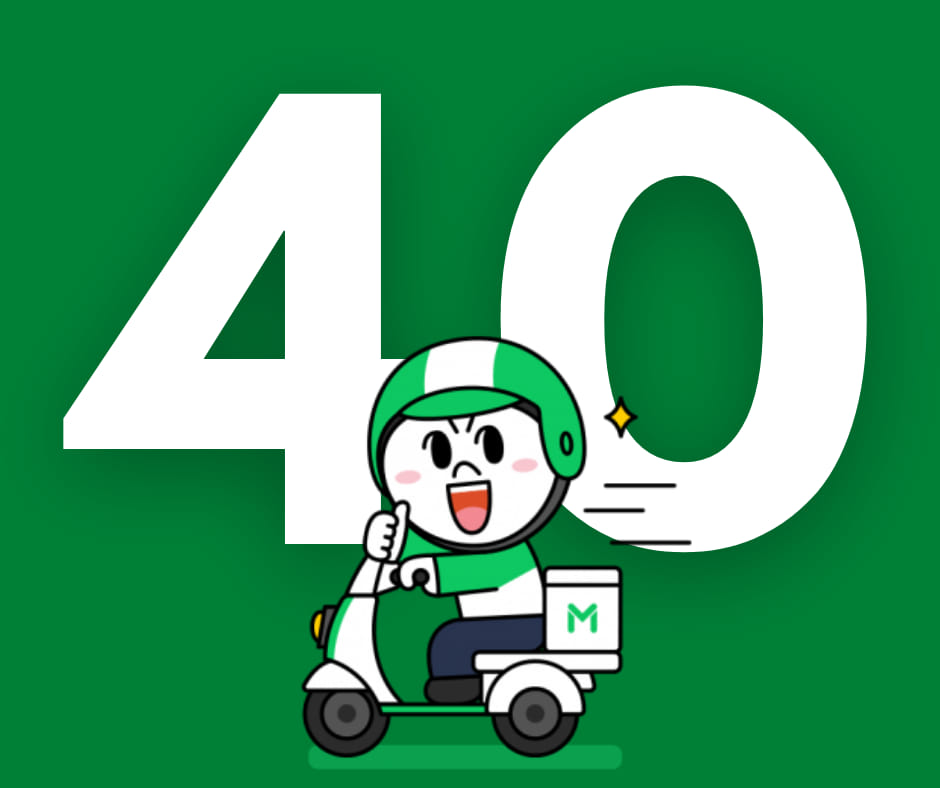
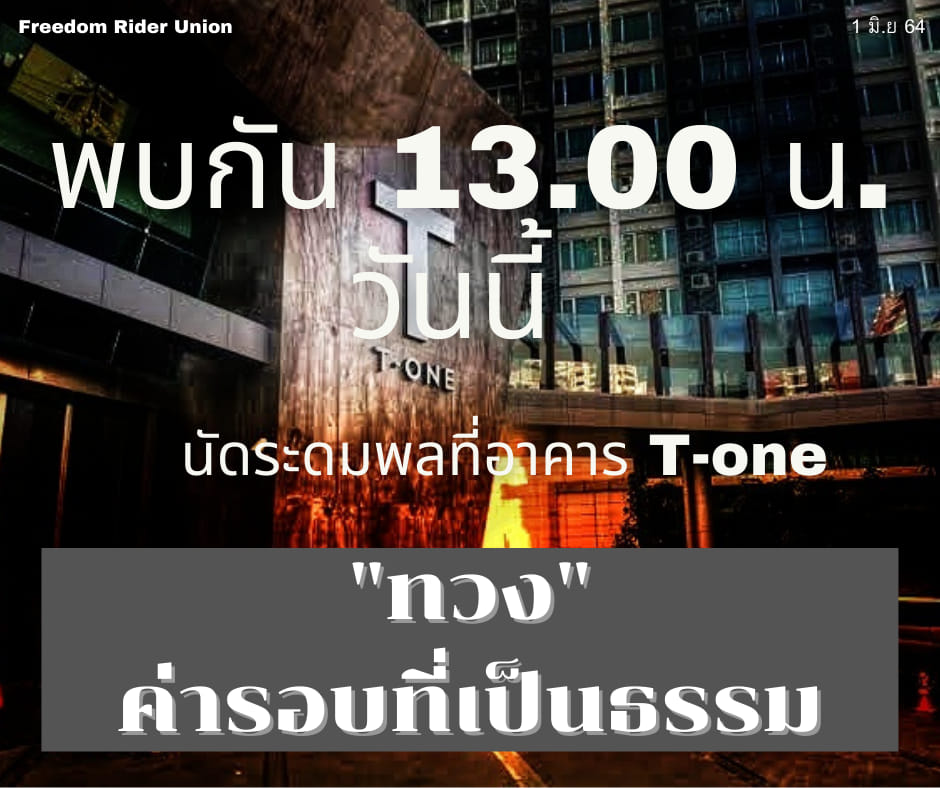
The Workpoint Today news agency reported that provincial riders were only notified just hours before the pay cuts went into effect, with no explanation given. This was about 11 o’clock on June 1st. The Freedom Riders Union then took the responsibility of coordinating the gathering of LineMan Riders from Ayutthaya, Ang Thong and Singburi provinces at the headquarters of Lineman-Wongnai on Sukhumvit Road in Bangkok.
This is not the first time that the LineMan riders have voiced their opposition to the company’s pay cuts, says the Just Economy and Labor Institute. Back on March 26th, riders in Bangkok also rallied to demand that the company adjust their pay back to the original rate of 62 baht per run. They also made other demands such as to have the company review its policies on unfair rider agreements. After several hours of rallying on March 26th, company representatives finally decided to come down to collect the letter and made an appointment to announce the results of the company’s consideration within the next two days. However, the company did not end up increasing the per cycle fee to meet the demand.
#InitialDemands
The first rally of LineMan riders from the provinces started around 1:00 p.m. on June 1st. One representative of this group of riders remarked,
“The company likes to take advantage of its workers who already have to work so hard. Our car needs to be used every day, our phones must be used every day. This takes maintenance. But our income remains stagnant. I want the company to realize that if the riders are treated fairly, the company will grow. But they keep crying about profit loss. What profit loss? The rider is the one riding in the hot sun, weathering harsh conditions. We’re the ones dealing with the customers. They must sympathize with us, not just complain about profit. I want one of the capitalists working in their air-conditioned rooms to try to do what I do. In Ayutthaya, for 20 baht per run for example. And some orders are a 30-40 kilometer ride. I want them to see what it’s like.”
In addition, the riders in Ayutthaya and others who were unable to join the protests in Bangkok participated by not accepting any work, causing backlogs in the system.
On the evening of the protest on June 1st, LineMan Co. sent Issariya Phairi, their Public Affairs officer, down to listen to the claim. A representative of the riders expressed to Issariya what needed to be addressed by the company, as follows:
- Set the compensation price back to 40 baht per round. If possible, riders of all provinces should have an equal rate. This means that the company would compensate riders using this rate, not using incentives. *This is the most important claim.
- Get rid of the policy in which new riders have the privilege of accepting an order first. (They are given a 4 second head start, putting other riders at a disadvantage.) The company should get rid of this unfair policy.
- Fix the in-app navigation to more closely match Google maps.
- Make the order assignments more reasonable according to distance, in that riders closest to the restaurant are the ones who take the order. It makes no sense that riders within a closer radius to the restaurant can’t see the order pop up, and a rider who is further away ends up taking it.
- Have the company improve the way in which the administrators or CS solve problems brought up by riders, with quicker responses and more respect to the rider.
- Address other issues, such as claiming food orders that are difficult to process. It needs to be more convenient.
Issariya thanked them and promised that the company would address these issues. They guaranteed that the riders’ complaints would be heard, and management would respond directly by tomorrow afternoon on the LineMan Official page, but they could not guarantee how the management would respond. However, the riders insisted that management respond to the demands immediately, within that day. Issariya agreed to this. After that, the riders dispersed the rally.
But it did not stop there. The Freedom Riders Union page and message box were filled with a large number of reports that protests were happening in many other provinces. This included Chiang Mai, Tak, Nakhon Pathom, Nakhon Phanom, Phichit, Phitsanulok, Sisaket, Chonburi, Phuket, Tak, Phetchabun, Chainat, Pattani, Chachoengsao, Nakhon Si Thammarat, and Nakhon Ratchasima. Rallies were held in these various provinces from June 1st to June 3rd. Some provinces held more than one rally, such as Ayutthaya, and many provinces held events in solidarity. In some places, there were also coordinated strikes to not accept any orders.
#Let’sRallyAgain
After the dissolution of the Bangkok rally on June 1st, the company responded via the LineMan Rider official page at around 4:00 p.m. on June 2nd, addressing various demands. However, there was no mention of the demand to raise the pay rate, which the riders saw as most important.
The Freedom Riders Union immediately responded by bringing the provincial leaders together to consolidate their demands into two items, the first being the reinstatement of a 40 baht pay rate per delivery run (to be implemented nationwide except Bangkok, which is currently set to 50 baht), and the second being that the company must address the needs of their existing workers before hiring new ones, to prevent further oversaturation of the workforce. They also invited all LineMan Riders to change their profile picture to the LineMan avatar on a green background with the text ’40’ to reflect the main demand of the 40 baht pay rate.
Later, a coordinator for the Freedom Riders Union released a poster publicizing a reunion at Gaysorn Tower (before moving to the T-One building headquarters) on June 4 to keep pushing for the demands that the company did not meet. This rally would include riders from Ayutthaya, Ang Thong, Sing Buri, Chachoengsao, Chonburi, and more.
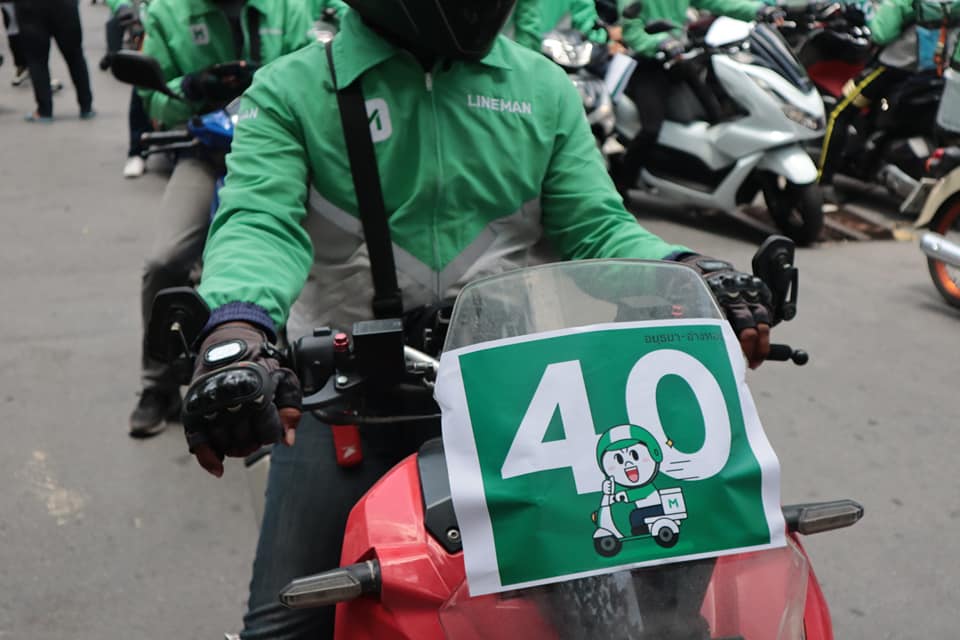

The second major rally kicked off at noon, to pressure the company into responding to these two demands:
- Compensation in the provinces must be no less than 40 baht per 2 kilometers (and 8 baht per every added kilometer)
- If the company wants to hire new riders, they must first consult with the existing ones for approval, since expanding the workforce affects every rider.
By 1:40 p.m., the company still had not sent representatives to come down to address the riders. However, it was announced on the company’s page that the compensation would be adjusted after midnight that night, but it was not specified how much this adjustment would be. The riders were not satisfied with this, and were weary that the company would not meet their demands, so they decided not to disperse just yet.
Later, around 2:00 p.m., they received notice that the company was seeking to negotiate with a rider representative again. The riders then responded with the condition that the negotiations had to be live for public hearing, but the company refused. The riders then waited until around 3:00 p.m. until they announced that they would start blocking off the roads in front of the building if a representative did not come down to receive their demands.
By 7:00 p.m., the company still had not responded. Some riders began to wait in the front yard of the building. The Freedom Riders Union coordinator announced that the riders would be settling here until they received a response from management.
The Just Economy and Labor Institute spoke to riders from Ayutthaya who were at the rally that day, who explained that their compensation per delivery was reduced from 40 baht to 35 baht, and down to 30 baht eventually. Further, after 15% was deducted for company fees and another 3% for income tax, they were left with only 24.50 baht per order. Waiting for and completing that one order could take up to an hour.
A rider noted:
“The cost of a run in Bangkok versus other provinces is very different, but the cost of gas, vehicle maintenance, and telephone costs are about the same. It’s not that the company reduced our pay once and we are overreacting. It has been reduced multiple times. This time, we can’t take it anymore. We can’t live. We’re not asking for much— when comparing our demand for 40 baht to the current rate, and after taking into account various deductions, we’re actually only asking for a 6 baht increase per delivery.”
Around 8:15 p.m., a company representative (name and position unknown) came down to negotiate with the riders. The riders were told that the company was not willing to increase the pay rate in all provinces to 40 baht, but that the rates would be readjusted to be the same as before the last reduction on June 1st. This also meant that each province would still have a different rate, same as before. The company would announce the new rate according to each province in the riders’ app.
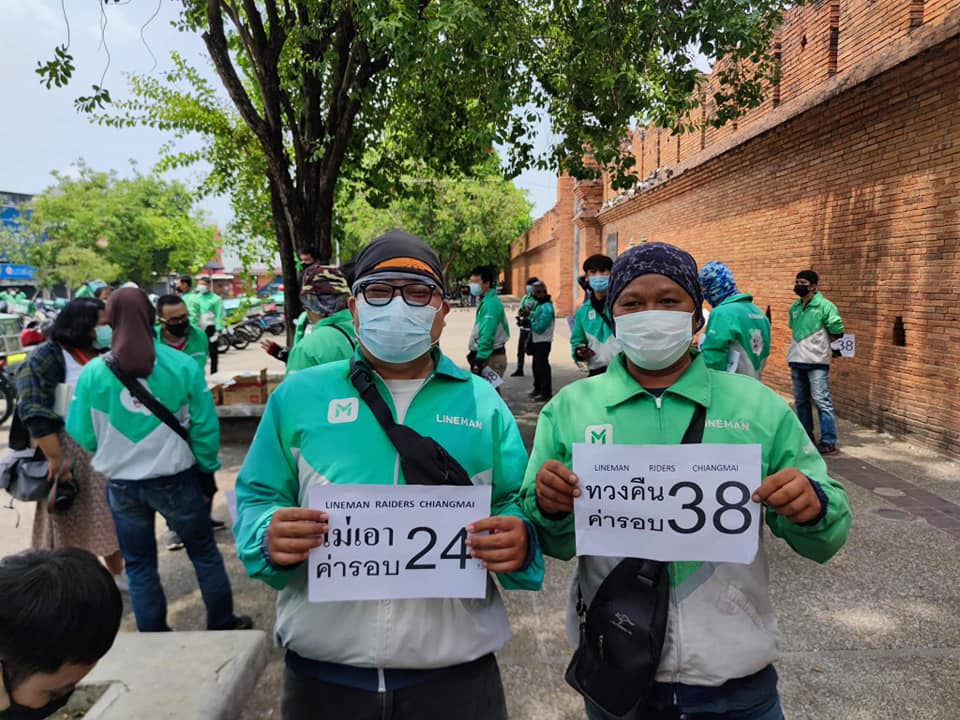
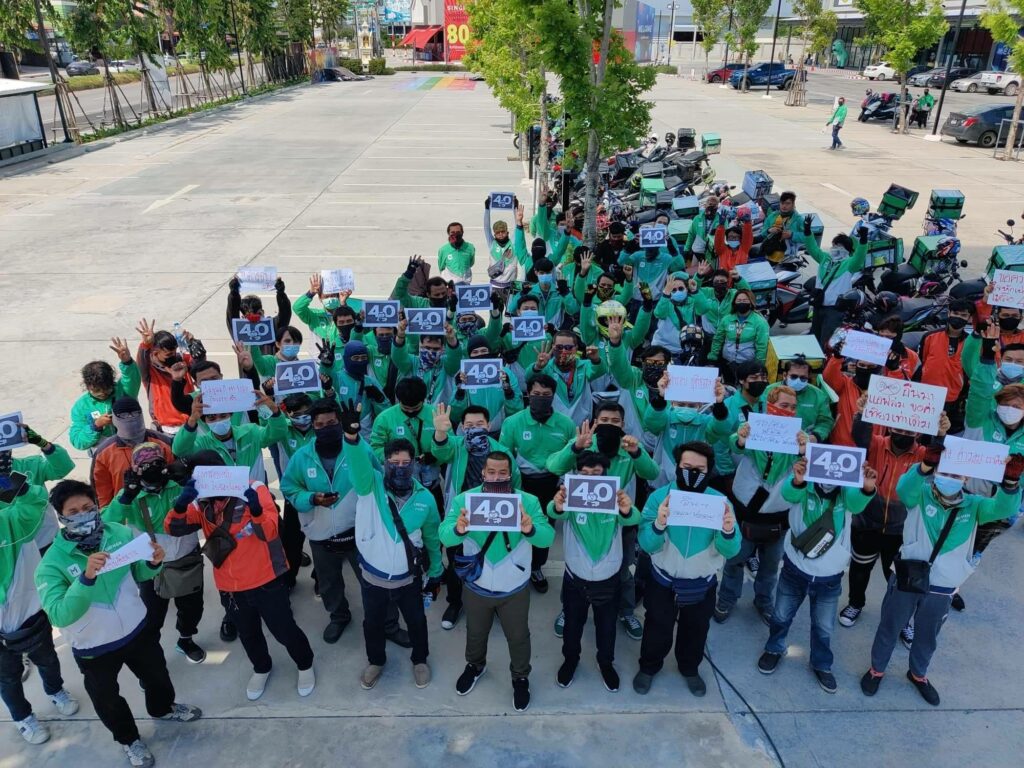
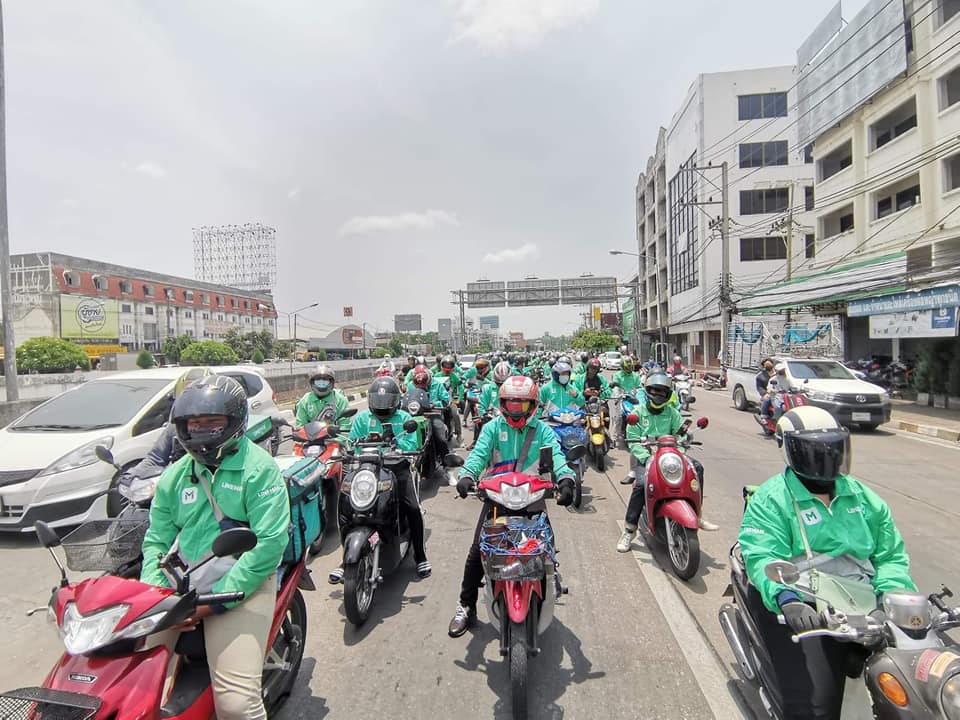
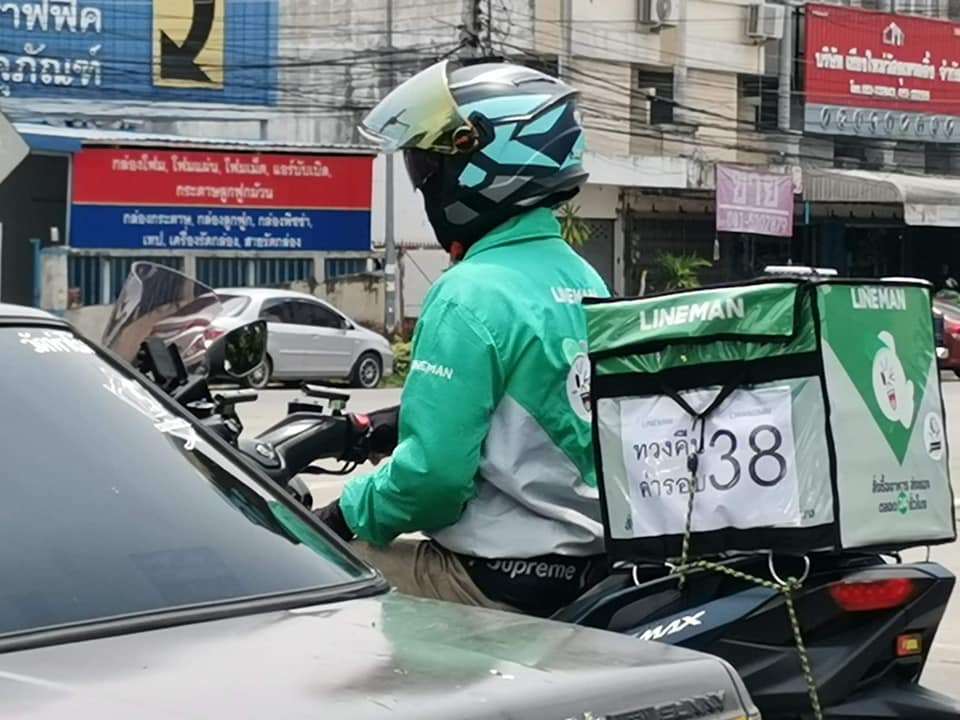
#It’sNotOverYet
The company has used the reasoning of ‘if the cost of living in other provinces is cheaper than Bangkok, then the wages of provincial workers must be cheaper.’ This is why, according to them, there should be unequal compensation according to each province. The riders are not satisfied with this reasoning, because their view is that nowadays, the cost of gas, telephone expenses, food expenses, etc. in the provinces are almost no different from the prices in Bangkok. But wages are still very different.
The new rates that have been announced are still unsatisfactory to many riders. On June 8th, riders in Nakhon Phanom, who were receiving a rate of only 21 baht per delivery, coordinated a strike to not accept any orders from 12:00-1:00 p.m., to protest the company policies that were forcing riders to rely on unstable income from incentives. The riders were forced to rely on the unstable income from these incentives as opposed to a fixed pay rate.
Riders in Suphan Buri province announced another rally on June 13th. Meanwhile, the riders of Chonburi province announced that they would stop accepting work altogether on June 14 from 5:00-7:00 p.m. and June 15th, from 5:00 to 8:00 pm, to increase pressure on the company to accept the demand of a 40 baht pay rate. They also coordinated a symbolic assembly (#ChonburiWillNotTolerate) for Sunday, June 20th, and an all day strike on June 21st as well.
The Freedom Rider Union also noted that these pay reductions may be the result of the Ministry of Commerce program to “reduce commercial prices to help the people” back in February, since they hosted a discussion with LineMan Co. and some 11 other online platform companies, to help reduce the price of food and delivery costs for the public for a full month (ending Feb 28th). However, no rider representatives were part of the discussion. The company may have been attempting to recover lost profit from this project by reducing compensation for their workers. Therefore, riders also traveled to submit a letter to the Labor Commissioner at the Parliament House demanding that riders be accounted for as well. (There was an appointment to follow up on this claim on Wednesday, June 23rd)
The letter specified two issues that the government should work to solve for the riders, namely:
- Examine the impact of this project to “reduce commercial prices to help the people” on riders, especially regarding the reduction of their pay rates which could have been a direct result of this project
- The platform companies have been expanding through their networks, and they are now essentially given the option to recruit an unlimited number of people. The problem is that the jobs available in the system are limited. An oversaturated workforce reduces the bargaining power of the riders. Therefore, the government should issue measures to limit the number of hires for these companies.
